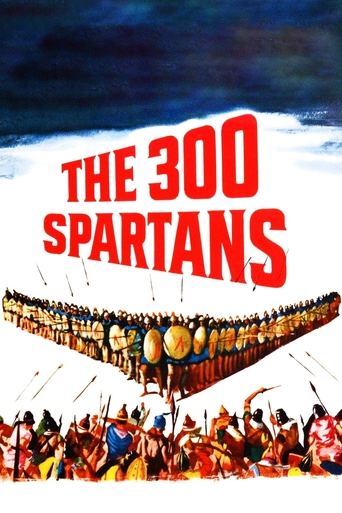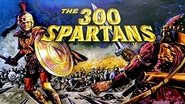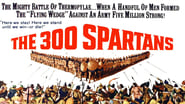hou-3
This film is truly awful and should be allowed to expire gracefully. Okay, an attempt is made to explain some of the Greek politics which led to 300 men being pitched against tens of thousands. My goodness, it even has Ralph Richardson as Themistocles - he turns in a professional performance though I wonder what he made of the finished product, assuming he watched it? It was filmed in Greece and the blue skies are lovely. That's all the good points though. The worst feature is the script, which is really, really dire. David Farrar as Xerxes has some of the worst lines, and they are extraordinarily bad - I see that he retired to South Africa after making this movie and who could blame him? The Cold War message is overt and the lame subplot - no sex before we get married, thanks - cringe-making. I watched it as far as the scene where a detachment of Spartans attack the Persian camp by night. They wade through the bay in a long line, wearing full armour, with their cloaks on ... and nobody spots them! The film crew must have killed themselves laughing. This was slack, underdeveloped script writing, the writer obviously couldn't be bothered, treating his audience with contempt. Direction was by the numbers and acting wooden, all in all, typical early 60s dross.
david-sarkies
While I thought that the movie 300 with cinematrographically dazzling, this film, to me, is the more historically accurate (as much as a Hollywood film is accurate). The movie is based on one of the most famous battles in the ancient world (though there is probably still a lot of debate as to what the greatest battle was though). This battle, to me, is famous, because it is not only a battle where the protagonists were defending their freedom, but also because Leonidas, one of the Spartan Kings, went against the wishes of his people to go and lay down his life for all of the Greeks. It is also a tragedy, because not only was he fighting against incredible odds, but also because in the end he was betrayed.This movie does a very good job in painting the background and explaining to us who the major characters are. While a movie based on the events in the 2nd World War need little explaining, most events in the ancient world are unknown by a majority of the populace. While we may have all heard of Alexander the Great and Julius Ceaser, very few of us can say who Themistocles, Leonidas, and Xerxes the Great were (Themistocles was an Athenian Admiral, while Xerxes was the Persian king who desired to complete what his father was unable to do, and that is conquer Greece - he failed).As mentioned, while the special effects in 300 are impressive, in the end it comes down to being able to replay the events close to the actual events, and to give the audience enough background so that they are not scratching their heads wondering what is happening and why it is happening. This movie does both of these things quite well.One should mention the story behind the movie, and that is the battle of Thermopylae. Around the 5th and 6th Centuries BC, Persia had risen to become a world superpower under the king Cyrus the Great. During the reign of his son Darius, a section of the empire, along the Anatolian coast (the Aegean seaboard of Turkey, known as the Ionian citystates) revolted against Persian rule with the help of the Greeks. Angered at their meddling, Darius raised an army to attempt to crush the Greeks. His first foray met with disaster when his navy was destroyed by a freak storm in the Aegean, and his second foray met with disaster when his troops were defeated at the battle of Marathon. However, Darius died before he could mount a third expedition, and this was taken up by his son Xerxes. Thus Xerxes raised the biggest army that the world had ever seen (according to the historian Herodotus) and made his way to Greece. However, he was temporarily halted at the pass of Thermopylae by a small force of 300 Spartans (King Leonidas and his personal bodyguards) for about a week, however when Leonidas was betrayed, in that Xerxes was told of a goat track around to their rear, their brave and valiant effort came to naught.While this movie only retells a famous historical battle, the event itself shows how people are willing to risk all to protect their desire to be free. Many historians have explored this event and speculated on how the world would have turned out if the Greeks had lost. This, in the end, is irrelevant, because the won. Still, counter-factual history to assist us in understanding the relevance of the event and how this event impacted upon the world in which we live.
barbarellaa
All in all, it's not a bad movie. But if you like Ancient History and have seen or read anything related to one of the most heroic and important moments of world's history (Persian Wars/Thermopylae), you'll probably feel that this movie has tried, but not really made the mark.My main feeling is the movie has lacked serious proper research. To start, the costumes are not even from the Greek period (V cent. BC) but actually later Roman (!) It is not just the acting pointing to the 60s but the superficial approach of the script (and direction) towards the motivations and personality of characters such as Leonidas, the Spartan King. Leonidas was brave but he did not take that lightly the battle and the decision to sacrifice himself and his army. He was the most respected king of Greece and Sparta the most powerful army. He knew his decision was going to shake Greece as an earthquake.A bit of research would have avoided the inconsequent laughs and silly smiles without sacrificing the story, adding key elements to give the audience the source of power of both kings (Leonidas = democracy/individual freedom; Xerxes = autocracy/submission fear) and the clash of civilisations that was about to happen.The romantic sub-plots are useless and do not help tell the story. Again, the historical sources are filled with interesting elements that could had add a lot more drama, and based on facts (as far we can tell).Although I don't want to, it is impossible not to compare with '300' from Frank Miller. Even discounting the highly graphical impact, that version has, undeniably, far better consistency in the historical elements. "The 300 Spartans" can be seen as entertainment but if you really love Ancient Greece, get Miller's 300 and then do yourself a favour and google Thermopylae. You will learn the facts having some fantastic visuals to match. Time travel guaranteed!
petit76
It is only a vague memory of seeing this film four decades ago, but it impressed me for several reasons. It is (like ZULU DAWN, but more meaningfully) the story of a military defeat and massacre. It is also one of the handful of American or British films dealing with the history of ancient Greece. And, it is one of the few historical films that got the facts correct.If one thinks about it, Hollywood only produced five other films dealing with ancient Greece between 1950 and 1990. They were "Alexander the Great" (directed by Robert Rossen), and "Jason And The Argonauts" and "Clash Of The Titans", the latter two not about classic Greek history but about the myths of the search for the Golden Fleece and of Medusa and Perseus. The fourth film was "Helen Of Troy" (which starred Cedric Hardwicke, but introduced Brigid Bardot to the U.S.). The fifth film was "The Trojan Woman", a film based on Euripides' tragedy and starring Katherine Hepburn. Italian productions were better, including "Ulysses" with Kirk Douglas and Anthony Quinn, and all those "Hercules" films with Steve Reeves. But the personalities of Golden Age Athens, like Pericles, Socrates, Plato, Alcibiades, never made it onto the big screen."Alexander The Great" was a fairly good film, and recently a new film on the conqueror was made. Also a new film about the Trojan War. Both flopped at the box office. That is why such films rarely are made - the bottom line is will it sell movie tickets (or DVDs). Neither did.So it is a losing battle. But we are losing a great deal of history by ignoring it. So it is rewarding to see a production that dealt with a critical military turning point.In 490 Darius of Persia attempted to conquer the free Greek states, as they were constantly causing trouble in his Greek possessions on the eastern shores of the Black Sea, Asia Minor, and the Eastern Meditteranean. His forces were defeated at the battle of Marathon. Marathon has been immortalized by a summer Olympic race that is named for an event in the battle: how Pheiddipides ran the twenty miles from Athens to Marathon and back without rest to report the victory, and dropped dead a moment after he announced it.Darius died, and his son Xerxes decided to try again. He gathered the largest army in history (reputedly 2 million soldiers) from his empire, and crossed over into Greece, determined to smash Athens. However, this bulky army had to go through narrow mountain passes, and reached Thermopylae. Here a small Spartan army of 300 men, led by King Leonidas, repeatedly held off the attack. Besides showing superior military abilities to the Persian commanders, Leonidas had the added advantage of having a fighting area where the huge Persian forces could not manipulate their troop size in. He could have left several times, after each bloody repulse of Xerxes' men, but he refused because he wanted all of Greece to prepare for this onslaught. He finally told his last messengers to tell the Spartans that his men would never retreat and would die for Greece.In the meantime, Themistocles (the leading political figure in Athens) had been arguing for the need of the sea port to take advantage of it's big calling card - it's huge fleet. Sparta was the great land power, and Athens the naval power. Themistocles started making arrangements for what would be the devastating blow to Xerxes' plans of conquest. Xerxes needed his ships to ferry his huge army back and forth across the Hellespont. Wipe out the Persian ships, and their huge size was not such an advantage anymore.Eventually a traitor gave Xerxes the key to destroying Leonidas and his men - a secret path behind Thermopylae. Surrounded the last chance to retreat was rejected by the King, and the men of Sparta fought until all 300 were killed. But the death toll was like that at the Alamo, as the Spartans just kept killing Persian troops. We don't have the stats available but several thousand troops (mostly impressed slaves, unfortunately) were killed.Xerxes moved onward, approaching Athens. On top of a hill overlooking Salamis Bay, he watched as his huge fleet was faced by a smaller Athenian one. But Themistocles had set up his ships in such a way as to get the larger, more cumbersome Persian ships jamming into each other. The Greeks destroyed most of them, thus making ferrying troops or supplying two million men impossible.Xerxes himself went home - he could not bear to watch what was going to happen. A Spartan led Greek army destroyed his weakened army at the battle of Plataea in 279 B.C.E. Persia never again threatened to grab Greece.The story of the 300 Spartans is now part of western legend - that against all odds, and in the face of death, a small force can make a difference and frequently does. Richard Egan was quite good as Leonidas, and Ralph Richardson did well in a supporting part as Themistocles. David Farrar played the arrogant, but ultimately humiliated Xerxes nicely.A 19th Century Australian poet, Adam Lindsay Gordon, wrote this regarding the sacrifice of Leonidas and his army."We eat and drink or ere we die, (The sunlight flashes on the sea.) Three hundred soldiers feasted high An hour before Thermopylae; Leonidas poured out the wine, And shouted ere he drained the cup, 'Ho! comrades, let us gaily dine -- This night with Pluto we shall sup;' And if they leant upon a reed, And if their reed was slight and slim, There's something good in Spartan creed -- The lights are growing dim." Evren Buyruk,Tx






